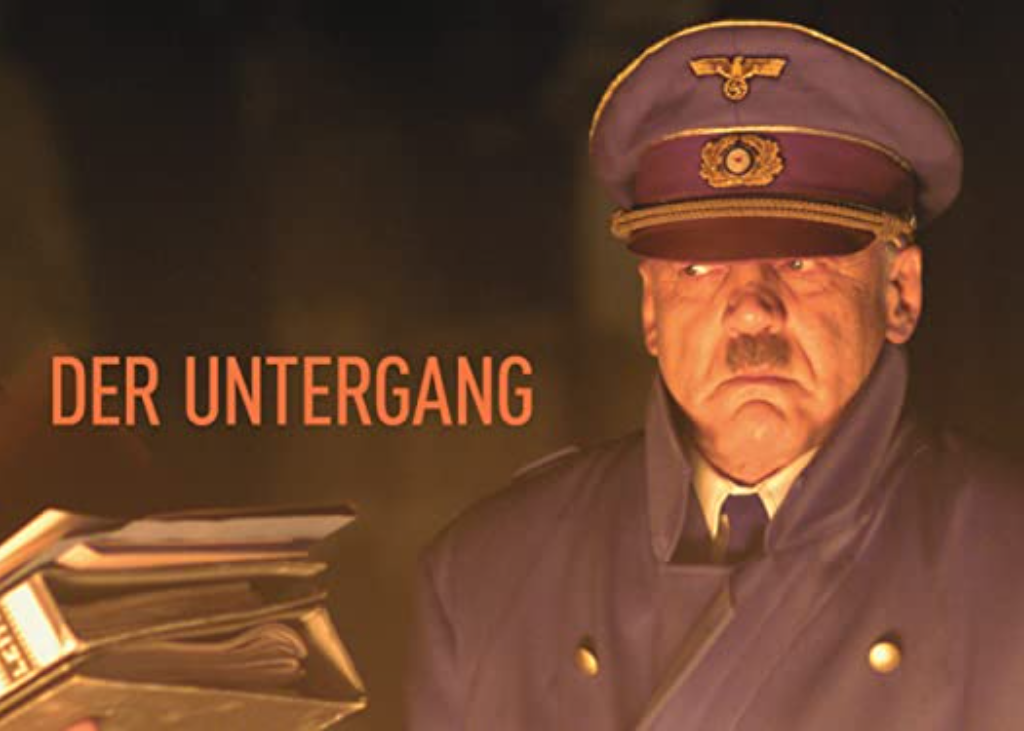Downfall Film Analizi
Önceki


Downfall (originally Der Untergang) is a historical drama film made in 2004 that set during the period of Nazi Germany in times of World War II, from the perspectives of Hitler and mostly other Nazi members. The film is based on the book "Der Untergang: Hitler und das Ende des Dritten Reiches". Produced by the Bernd Eichinger, the film stars are Bruno Ganz, Alexandra Maria Lara, Ulrich Matthes, Rolf Kanies, Juliane Köhler, Corinna Harfouch, Heino Ferch, Thomas Kretschmann and directed by the Oliver Hierschbiegel.
Downfall (originally Der Untergang) is a historical
drama film made in 2004 that set during the period of Nazi Germany in times of
World War II, from the perspectives of Hitler and mostly other Nazi members.
The film is based on the book "Der Untergang: Hitler und das Ende des
Dritten Reiches". Produced by the Bernd Eichinger, the film stars are
Bruno Ganz, Alexandra Maria Lara, Ulrich Matthes, Rolf Kanies, Juliane Köhler,
Corinna Harfouch, Heino Ferch, Thomas Kretschmann and directed by the Oliver
Hierschbiegel.
Third Reich was in the wage of the cruel fight
against both Allies and Soviet Russians during 1945, the last year of the
bloody warfare. But looks like a decisive defeat was near for the fate of the
Nazis.
After had been defeated on many fronts, Nazis were
stuck in the defence of Berlin. Furthermore, Russians were advancing towards
Berlin, where Hitler and his officials are located. So, the film's plot is
historically and dramatically animating Hitler with a closer point of view in a
broader sense, where their all hope is to be crushed and Nazi Germany will be
defeated to end.
In those times, Hitler and his generals are hoping
for further possible help, which can be derived from the armies in both the
Eastern and Western front to rescue the Third Reich. Hitler was believed to his
army and generals to make Third Reich stand up and conquer all Europe and
Russia again. But it did not happen at all. Hitler was poisoned by the concept
of power, which had to make him blind to political and military issues. His
ideology that is based upon the ethnocentric point of view (rather we can call
“racism”) has corrupted the politics of Germany in many ways. This corruption
is revealing itself in film from child fighters that were brainwashed by
Goebbel’s propaganda to lickspittle command structure of the Third Reich.
In the film, there was a scene that Hitler is
genuinely justifying himself and justifying his commanders to make them believe
to they are much stronger than both Russians and Allies. To support this
thesis; Hitler has said to his new Chief-of Airforce about new German fighter
jets that are in the manufacturing process by the German engineers will crush
enemies in the skies, soon. But, when Hitler is saying it, Russians were
advancing towards Hitler’s bunker in Berlin.
When we discuss the concept of ethnocentrism in
Hitler’s ideological stand, Jews are still targeting by Hitler’s bloody
ambition. In one scene, when Hitler becomes truly disappointed by the further
developments and facts, He has motivating himself that still saying by “I
killed enough Jews”. His ideological tendency upon addiction of anti-Jewish
actions, still in his agenda, despite all those worst circumstances that Third
Reich had been into it.
Another point that can be discussed, in my view, is
Hitler’s deterministic philosophy. In several scenes in the film, Hitler is
mentioning about the principle of natural selection, the survival of the
fittest in evolution. Hitler has believed this principle in political life,
according to the film.
“Our people need to die, throughout the natural law”
(Hitler)
The concept of natural law shall be referred to as
the deterministic point of view, where all the events are determined by nature
itself. So, Hitler is justifying his belief in crushing the weaknesses. Thus,
the strong one can live.
The next point to be discussed is Hitler’s traumatic
actions about punishing everyone that he believed to deny his orders. He is
considered several generals' “traitors” for his failures that make his whole
country and people desperate. But he is quite blind to “facts” and the
realities of the Third Reich. He is representing a model of tyranny that
accuses everybody because of his own mistakes that worsened the situation.
Because of inefficient decisions held by Hitler and under his weakened
leadership, most of the commanders in his office and people who are closely
working with him left him alone. Despite many abandonments in film, there were
still several Nazi commanders who were obeying his rule.
Next of all those things, in the film, Hitler’s
image looks like some kind of “innocent” and “desperate” things that can be
considered in the attitude of human beings. But it would not be logically true
to consider Hitler in such a humanitarian context with desperate utopias and a
leader with ruined dreams. That will be a mistake for all those killings,
holocausts, and war crimes that Hitler caused intentionally or unintentionally
himself.
In conclusion, the Downfall is a significant film
for a dramatically based history and developments that held in World War II
Germany, Hitler’s bunker in Berlin. It will give us an emphatical point of view
from the Nazi side of the war to understand the terms of period and atmosphere.
I am recommending this film for people who have a curiosity about World War II
Nazi Germany and European history.
Kerem Cankılıç
European Studies Intern
© Copyright 2025 TUİÇ Akademi - WebTech Bilişim tarafından sevgi ile geliştirildi.
YORUMLAR